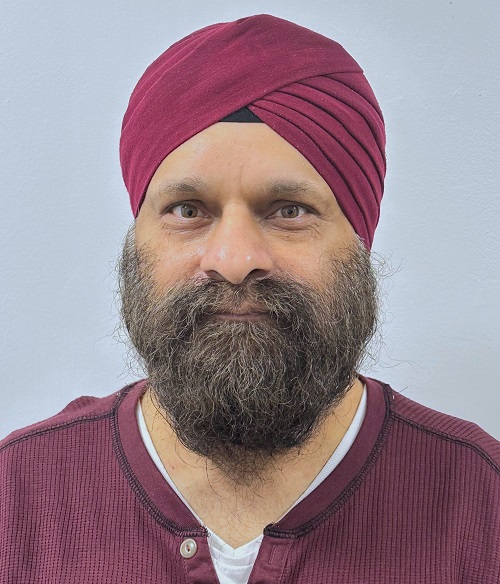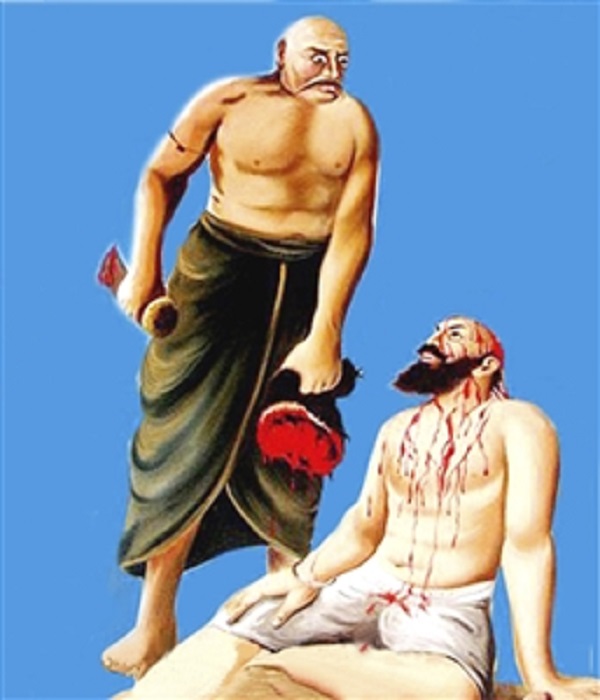By: Surjit Singh Flora

(Samajweekly) Bhai Taru Singh was born around 1720 into a Sandhu Jat family in Amritsar during the reign of the Mughal Empire. He was brought up as a Sikh by his mother, who was a widow, and had a sister named Tar Kaur. Bhai Taru Singh was brought up as a Sikh by his widowed mother, Bibi Dharam Kaur, after his father, Bhai Jodh Singh, lost his life in battle.
After witnessing the heroic act of Sikh fighters rescuing a young girl from the oppressive Mughals, Bhai Taru Singh was inspired to join the Sikh faith and was initiated into the Khalsa.
He had a younger sister named Bibi Tar Kaur. He was a devout Sikh who faithfully followed the teachings of the Sikh Gurus. He dedicated himself to working diligently on his land and lived a simple life. Despite not being wealthy, he found happiness and generously supported his fellow Sikh community.
Bhai Taru Singh hailed from the Sandhu Jatt family of Puhla village in Amritsar district of the Punjab. His parents were Shaheed Bhai Jodh Singh and Bibi Dharam Kaur.
Bhai Taru Singh (c. 1720[1] – 1745) made the ultimate sacrifice for his faith, opting to lay down his life rather than renounce his religion. The emperor was a Muslim who desired for everyone to embrace Islam.
Bhai Taru Singh selflessly dedicated his efforts to supporting his fellow Sikhs who were compelled to leave their homes due to religious persecution. Akil Das (also known as Harbhagat Niranjania) of Jandiala, a Muslim informer, spied on Bhai Taru Singh. In the Prachin Panth Prakash, it is mentioned that Zakariya Khan once inquired about the source of nourishment for the Sikhs to his men. I have prohibited them from all occupations. They understand the concept of tax exemption. They are prohibited from farming and engaging in business or public employment. I no longer provide any offerings to their gurdwaras, their places of worship. They have no access to any provisions or supplies. Why don’t they perish from sheer starvation?
Harbhagat, who has a deep animosity towards the Sikhs, commented, “There are individuals in the Sikh community who prioritize feeding their fellow brethren before nourishing themselves.” They are willing to sacrifice their own needs, even if it means going without food and clothing, because they cannot bear to see their comrades in distress. They would spend the winter by the fireside, keeping warm and sending their own clothes. They would work hard to process corn and have it delivered to them. They would willingly undertake the most difficult tasks in order to earn a modest income for their own benefit. They travel to faraway lands to earn money for their siblings living in a foreign land.
“In the village of Puhla in Majha,” Harbhagat continued, “resides a man named Taru Singh. He diligently tends to his land and dutifully fulfills his obligation to pay the revenue to the officials. He consumes a minimal amount of food and generously sends the remainder to his siblings residing in the jungle. His mother and sister work tirelessly to earn a living. They consume their meals in moderation and dress in simple, rough-textured garments. They pass on whatever they save to their fellow Sikhs.
With a contingent of twenty policemen and armed with arrest warrants for Bhai Taru Singh and his sister, Harbhagat Niranjania made his way to the village of Puhla. Bhai Taru Singh calmly addressed the soldiers who had arrived to apprehend him, acknowledging their purpose to take him away as instructed by their superior. I am obligated to follow my Master’s orders and cannot allow you to leave without having a meal. The soldiers complied with his request and, after having their meals, proceeded to arrest him.
The Muslims forcefully removed Bhai Taru’s scalp and callously discarded it on the floor.
As Bhai Taur Singh was being arrested and taken away, the villagers passionately protested and pleaded with the policemen to release him, emphasizing his noble character, peaceful nature, and kind-heartedness. Unfortunately, their plea went unnoticed.
The police party was passing through village Bhadhana when the Sikhs of the village attempted to free Bhai Taru Singh by force. However, Bhai Taru Singh managed to convince them to refrain from doing so.
When Bhai Taru Singh was apprehended alongside his sister, numerous Sikhs stepped forward to assist in their rescue. Nonetheless, Bhai Taru Singh expressed his desire to demonstrate to the Mughals that Sikhs possess unwavering courage in the face of death. Despite initial reluctance, Bhai Taru Singh eventually agreed to let his sister be rescued. Sikhs and other villagers resorted to paying bribes in order to help his sister successfully escape. Despite his sister’s freedom being secured, Bhai Taru Singh remained steadfast in his decision not to seek a pardon. Bhai Taru Singh Ji received Amrit (Baptized as a Sikh) from Bhai Mani Singh Ji and was greatly inspired by him.
Bhai Taru Singh endured immense suffering while being held captive in a prison cell. Bhai Taru Singh’s unwavering determination to defend his faith only grew stronger as he endured relentless torture.
Bhai Taru Singh was brought before Zakariya Khan and respectfully greeted him with the Sikh salutation: Waheguru Ji Ka Khalsa, Waheguru Ji Ki Fateh. He stated, “I make a living by tending to my land and putting in a lot of effort,” when accused of sedition. I consistently make timely payments for land tax, which can easily be confirmed through the records. When participating in commerce, taxes are a necessary obligation. After our payments are made, what remains is solely for our sustenance. We share what we withhold from ourselves with our fellow human beings. We do not take anything from you. Why do you punish us, then?
Zakariya Khan was furious and unable to come up with a suitable response. He demanded to know from Bhai Taru Singh the source of his strength. Bhai Taru Singh claimed that his source of strength came from his kesh (hair), which he believed were bestowed upon him by Guru Gobind Singh. In a fit of rage, Zakariya Khan presented him with a grim ultimatum: either convert to Islam or face the brutal consequences of having his hair forcibly cut off and enduring a torturous death. Bhai Taru Singh inquired peacefully, “Will I never experience death if I were to embrace Islam?” Do Muslims not pass away? I will eventually pass away, regardless of my religious beliefs. Therefore, there is no reason for me to abandon my faith. of which I am incredibly proud? What could possibly motivate me to engage in an action that would cause me to lose the favor of my beloved Guru? If I were meant to be a Muslim, I would have been born to Muslim parents. I am deeply committed to my faith and will protect it with unwavering dedication, even if it means sacrificing my own life.
Zakariya Khan then mentioned that converting to Islam would result in the opportunity to marry a woman from a prestigious Mughal family. You will receive great wealth and a prestigious role. You will experience a life filled with joy and enjoyment. If you decline, your hair will be forcefully removed, and you will endure intense suffering. Ultimately, you will face a severe punishment, either through beheading or being subjected to the wheel. Take this advice seriously. Don’t disregard the potential that life has to offer. Bhai Taru Singh adamantly and resolutely refused to renounce his faith. He firmly stated that no amount of worldly temptations could make him abandon his religion, even if he was offered immense power, beauty, and wealth. This holds a value that surpasses all others. I absolutely refuse to let anyone touch my hair, not even a single strand. I am ready to face the inevitable. May the divine forces allow me to pass away with my hair untouched.
Khan summoned a barber to trim Bhai Taru Singh’s hair. Although the barbers attempted to trim Bhai Taru’s hair, they found it to be as tough as iron. Bhai Taru Singh declared, “I have remained steadfast in my faith, even with my hair.” The barber decided to stop attempting to cut Bhai Taru’s kesh, so Zakariya Khan then summoned a cobbler and instructed him to use his axe to cut Bhai Taru Singh’s scalp. In the midst of the torment, Bhai Sahib’s voice could only be heard reciting Japji Sahib.
Later that evening, Zakariya Khan reflected on the events of the day. He experienced a sudden inability to urinate. He was in extreme pain and believed he was losing his sanity. Despite the best efforts of all his medical specialists, there was no noticeable impact. After the physicians’ attempts proved unsuccessful, Zakariya Khan decided to send Bhai Subeg Singh to request forgiveness from the Sikhs. He was sent to the leader of Dal Khalsa. The leader remarked that Zakariya Khan would face dire consequences for his actions, as he had committed a grave sin and was fated to meet his demise before Bhai Taru Singh.
When Khan took the shoe of Bhai Taru Singh and struck his head with it, he was able to urinate. Regrettably, the pain resurfaced, and Khan found himself having to strike his head with increasing force each day. The Governor passed away on July 1st, 1745 A.D., after enduring for 22 days with the assistance of that shoe. Bhai Taru Singh passed away upon receiving news of the Governor’s demise.










